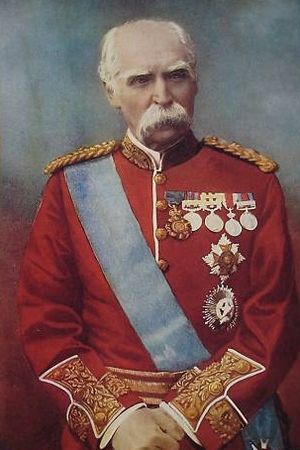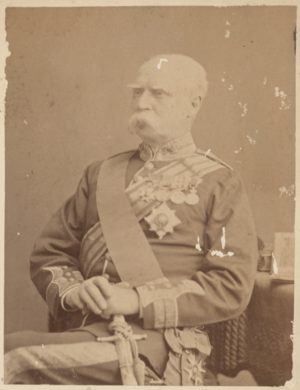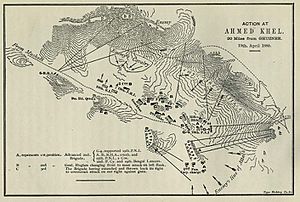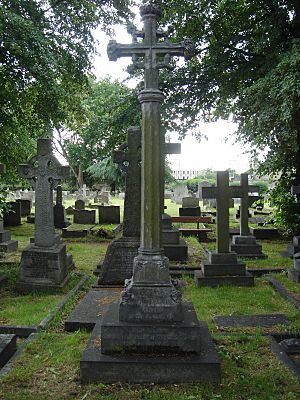Sir Donald Stewart, 1st Baronet facts for kids
Quick facts for kids
Sir Donald Stewart, Bt
|
|
|---|---|

Sir Donald Stewart
|
|
| Born | 1 March 1824 Forres, Moray, Scotland |
| Died | 26 March 1900 (aged 76) Algiers, Algeria |
| Buried |
Brompton Cemetery, London
|
| Allegiance | |
| Service/ |
|
| Years of service | 1840–1885 |
| Rank | Field Marshal |
| Commands held | Commander-in-Chief, India |
| Battles/wars | Indian Rebellion Second Anglo-Afghan War |
| Awards | See below |
Sir Donald Martin Stewart (born March 1, 1824, died March 26, 1900) was a very important officer in the British Indian Army. He became a Field Marshal, which is the highest rank in the army. He was also made a Baronet, a special title given by the King or Queen. Sir Donald Stewart fought in several important events, like the Indian Rebellion of 1857 and the Second Anglo-Afghan War. He was known for leading his troops through tough areas and for his leadership in northern Afghanistan. Later, he became the top military leader in India.
Contents
Early Life and Education
Donald Stewart was born in a place called Mount Pleasant, near Forres in Scotland. His parents were Robert and Flora Stewart. He went to schools in Findhorn, Dufftown, and Elgin. After that, he studied at the University of Aberdeen.
A Military Career Begins

Donald Stewart started his army career on October 12, 1840. He joined the 9th Bengal Native Infantry as a young officer called an ensign. He quickly moved up the ranks, becoming a lieutenant in 1844 and a captain in 1854. Later that year, he took part in a military trip called the Aka Khel Expedition. This was in the North-West Frontier region.
Fighting in the Indian Rebellion
In 1857, a big uprising happened in India, known as the Indian Rebellion of 1857. Donald Stewart played a key role. He famously rode from Agra to Delhi to deliver important messages. He then helped during the Siege of Delhi and the Siege of Lucknow. These were major battles where British forces tried to take back control of important cities. After these events, he was promoted to major in 1858 and then to lieutenant-colonel later that year.
Leading Troops and New Roles
Stewart continued to rise in the army. In 1862, he became a deputy-adjutant-general for the Bengal Army. He was promoted to colonel in 1863 and led a group of soldiers in a trip to Abyssinia in 1867. By 1868, he was a major-general. He then became the leader of a prison settlement on the Andaman Islands. While there, the British leader of India, Lord Mayo, was sadly killed by a prisoner. Stewart was present but was found to have done nothing wrong after an investigation. In 1876, he was put in charge of the troops in Lahore.
The Second Anglo-Afghan War
In 1877, Stewart became a lieutenant-general. He led a group of soldiers during the Second Anglo-Afghan War. His troops marched through the Bolan Pass to Quetta and then to Kandahar in 1879. This was a very difficult journey.
In March 1880, he made another tough march from Kandahar to Kabul. Along the way, his forces fought in battles like the Battle of Ahmed Khel and the Battle of Arzu. After these victories, he was in charge of both military and civilian matters in northern Afghanistan. When he heard about a big defeat at the Battle of Maiwand, he sent another famous general, Sir Frederick Roberts, to help. Stewart then led the rest of his army back to India. For his brave actions, the British Parliament thanked him, and he was given the title of Baronet.
Later Years and Important Changes
In 1880, Stewart became a military member of the Council of the Governor-General of India. This was like being the War Minister. In 1881, he became a full general and then the Commander-in-Chief, India. He wanted to make the army more efficient by combining the different armies in India into one, but this idea was not accepted at first. In 1885, during a tense situation with another country called the Panjdeh Incident, he made sure more British soldiers were sent to India.
He returned to London in 1893 and became a member of the Council of the Secretary of State for India. In this role, he again pushed for a single British Indian Army, and this time he succeeded! On May 26, 1894, he reached the highest rank, becoming a Field Marshal. He also joined a group that studied how money was spent on the army and became the leader of the Royal Hospital Chelsea, a home for old soldiers. Sir Donald Stewart passed away on March 26, 1900, in Algiers, Algeria. He is buried in Brompton Cemetery in London.
Family Life
In 1847, Donald Stewart married Davina Marine. They had two sons and three daughters. One of their sons, Donald William Stewart, also became a military officer. Lady Stewart, his wife, received a special honor from Queen Victoria in 1900.
Honours and Awards
Sir Donald Stewart received many important awards for his service:
- Knight Grand Cross of the Order of the Bath (GCB) - 1880
- Knight Grand Commander of the Order of the Star of India (GCSI) - 1885
- Companion of the Order of the Indian Empire (CIE) - 1881
Memorial
There is a special memorial to Sir Donald Stewart in St Paul's Cathedral in London.
 | James B. Knighten |
 | Azellia White |
 | Willa Brown |



